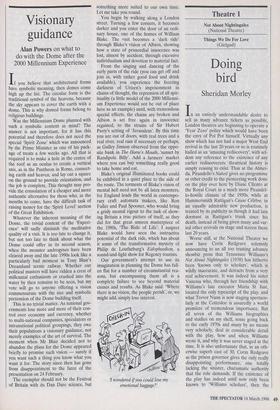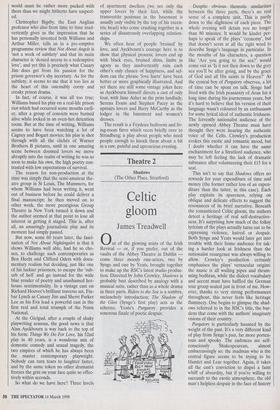Theatre 1
Not About Nightingales (National Theatre) Things We Do For Love (Gielgud)
Doing bird
Sheridan Morley
In an entirely understandable desire to sell as many advance tickets as possible, London theatres are beginning to operate a `Year Zero' policy which would have been the envy of Pol Pot himself. Virtually any show which has not had a major West End revival in the last 20 years or so is routinely hailed as an 'amazing rediscovery', with sel- dom any reference to the existence of any earlier rediscoverers: theatrical history is simply ceasing to exist. Thus at the Almei- da, Pirandello's Naked gives no programme or other credit to the pioneering work done on the play over here by Diane Cilento at the Royal Court in a much more Pirandel- lo-hostile climate of the 1950s, while at Hammersmith Rattigan's Cause Celebre, in an equally admirable new production, is treated by its publicity as though it had lain dormant in Rattigan's trunk since his death, instead of being given many and var- ied other revivals on stage and screen these last 20 years.
Worse still, at the National Theatre we now have Corin Redgrave solemnly announcing to an all too trusting advance showbiz press that Tennessee Williams's Not About Nightingales (1938) has hitherto been 'known only to scholars', which is wildly inaccurate, and detracts from a very real achievement. It was indeed his sister Vanessa who, through her friendship with Williams's late executor Maria St Just, located the only typescript of the play, and what Trevor Nunn is now staging spectacu- larly at the Cottesloe is assuredly a world premiere of tremendous importance. But all seven of the Williams biographies and studies on my shelf, some going back to the early 1970s and many by no means very scholarly, deal in considerable detail with the play, how and when Williams wrote it, and why it was never staged at the time. It is also unfortunate that, in an oth- erwise superb cast of 30, Corin Redgrave as the prison governor gives the only really disappointing performance, one totally lacking the sinister, charismatic authority that the role demands. If the existence of the play has indeed until now only been known to 'Williams scholars', then the world must be rather more packed with them than we might hitherto have suspect- ed.
Christopher Bigsby, the East Anglian professor who also from time to time inad- vertently gives us the impression that he has personally invented both Williams and Arthur Miller, tells us in a pre-emptive programme review that Not About Angels is `not a work of subtlety' and that its main character is 'denied access to a redemptive love', and yet this is precisely what Canary Jim does get from his passion for the prison governor's shy secretary. As for the subtlety, it seems to me that it too lies at the heart of this ostensibly corny and creaky prison drama.
In fact, of course, it was all too true; Williams based his play on a real-life prison riot which had occurred some months earli- er, after a group of convicts were burned alive while locked in an oven-hot detention room. But at the time of writing, Williams seems to have been watching a lot of Cagney and Bogart movies; his play is shot through with all the clichés of Warner Brothers B pictures, until in one amazing scene between doomed lovers we move abruptly into the realm of writing he was so soon to make his own, the high poetry con- trasted with low expectations of survival.
The reason for non-production at the time was simply that the semi-amateur the- atre group in St Louis, The Mummers, for whom Williams had been writing it, went out of business before he could deliver a final manuscript; he then moved on to other work, the more prestigious Group Theatre in New York turned it down and the author seemed at that point to lose all interest in getting it staged. This is, after all, an amazingly journalistic play and its moment had simply passed.
But now, some 60 years later, the fasci- nation of Not About Nightingales is that it shows Williams well able, had he so cho- sen, to challenge such contemporaries as Ben Hecht and Clifford Odets with docu- mentary realism but deciding, just like one of his luckier prisoners, to escape the 'sub- urb of hell' and go instead for the wide blue yonder of poetry and unashamed hot- house sentimentality. In a vintage cast on Richard Hoover's brilliant traverse set, Fin- bar Lynch as Canary Jim and Sherri Parker Lee as his Eva lead a powerful cast in the first real and total triumph of the Nunn National.
At the Gielgud, after a couple of shaky playwriting seasons, the good news is that Alan Ayckbourn is way back to the top of his form: Things We Do For Love, his 52nd play in 40 years, is a wondrous mix of domestic comedy and sexual tragedy, the two empires of which he has always been the master contemporary playwright. Nobody can turn tears to laughter faster, and by the same token no other dramatist freezes the grin on your face quite so effec- tively within seconds.
So what do we have here? Three levels of apartment dwellers (we see only the upper lovers by their feet, while the transvestite postman in the basement is usually only visible by the top of his eccen- tric head) who come crashing together in a series of disastrously overlapping relation- ships.
We often hear of people 'bruised' by love, and Ayckbourn's courage here is to show that physical process; lovers end up with black eyes, bruised shins, limbs in agony as they inadvertently ruin each other's only chance of happiness, and sel- dom can the phrase 'love hurts' have been better or more graphically illustrated. And yet there are still some vintage jokes here as Ayckbourn himself directs a cast of only four, with Jane Asher as the prim landlady, Serena Evans and Stephen Pacey as the upstairs lovers and Barry McCarthy as the lodger in the basement and women's dresses.
The result is a Feydeau bedroom and liv- ing-room farce which veers briefly over to Strindberg; a play about people who need people enough to knock them about a bit in a raw, painful and uproarious evening.



































































 Previous page
Previous page